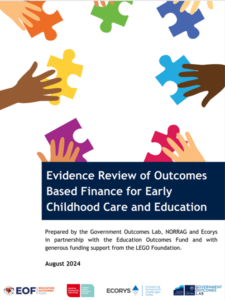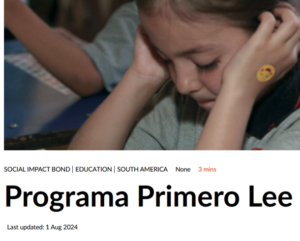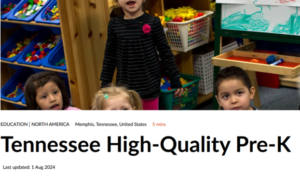- Projects
- Innovative Financing for Education
- Introduction to IFE
- IFE Research Papers
- IFE Mechanisms
- IFE Case Studies
- Education Impact Bonds Database
- Student Financing Resource Database
- IFE News and Events
- IFE-2-Leave No One Behind
- Collective Learning Initiative: Outcomes-Based Financing for Early Childhood Care and Education
- IFE Executive Education
- Results-Based Financing Project
- IFE and Development: E-Learning Project
- Resource Library
Collective Learning Initiative: Outcomes-Based Financing for Early Childhood Care and Education
Collective Learning Initiative: Outcomes-Based Financing for Early Childhood Care and Education
Commissioned by the Education Outcomes Fund (EOF), the Collective Learning Initiative (CLI) on Outcomes-Based Financing for Early Childhood Care and Education (OBF4ECCE) aims to build and strengthen connections between stakeholders at the intersection of OBF and ECCE to enable and encourage peer-to-peer learning and collaboration.
The CLI research consortium comprises EOF, the Government Outcomes Lab at the University of Oxford, NORRAG of the Geneva Graduate Institute and Ecorys. The CLI engages with experts involved in past, ongoing and upcoming OBF4ECCE programmes to surface, analyse, and share experiences and produce an array of knowledge products.
The first phase of the CLI ran from January 2024 to October 2024. The CLI anticipates subsequent phases of expansion to support the evolution of a community of practice.
Convening of Expert Stakeholders
Phase 1 of the CLI convened experts at the intersection of OBF and ECCE. Experts met three times, in March, June and September 2024. In March 2024, the research consortium introduced participants to the anticipated vision of the CLI and invited them to reflect on their experiences of engaging in OBF4ECCE programmes and to share their preferences for such a collaborative learning platform. In June 2024, Dr Mara Airoldi (Government Outcomes Lab) and Dr Arushi Terway (NORRAG) presented some emerging findings from the Evidence Review analysis before participants divided into three breakout discussion groups on the topics of metrics and measurement; strategies for government engagement; and trade-offs in design and implementation choices. The final convening, in September 2024, enabled expert stakeholders to delve deeper into facilitated conversations on measuring outcomes and costing and pricing outcomes for which participants were divided into the group of their choice. Subsequent phases of the CLI intend to continue such rich discussions amongst diverse OBF4ECCE stakeholders including practitioners, intermediaries, governments, researchers, and investors.
Knowledge Products
Evidence Review of Outcomes-Based Finance for Early Childhood Care and Education
August 2024
This evidence review takes stock of 22 documented, existing experiences of OBF4ECCE by surfacing, collating, and analysing available documents. Bilateral interviews, the convening of expert stakeholders, and the collective experience of the research team supplement the analysis. The review presents existing evidence and identifies substantial gaps in existing knowledge to inform the design of future programmes and research.
Suggested citation: Airoldi, M., Terway, A., Wooldridge, R., Thorne, G., Adams, L., Ronicle, J., Davies, J. and Anastasiu, A. (2024). Evidence review of outcomes-based finance for early childhood care and education. Collective Learning Initiative on Outcomes-Based Finance for Early Childhood Care and Education, Government Outcomes Lab, Blavatnik School of Government, University of Oxford.
Practice Note: Measuring Outcomes in Outcomes-Based Financing for Early Childhood Care and Education
October 2024
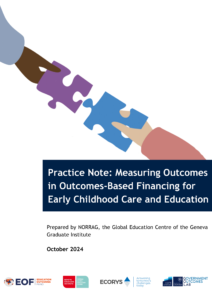 This practice note provides insights into the prominent issues and important considerations that need to be made for measurement in outcomes-based financing (OBF). It draws upon existing experience from OBF4ECCE projects at various stages of development, from design to implementation and completion.
This practice note provides insights into the prominent issues and important considerations that need to be made for measurement in outcomes-based financing (OBF). It draws upon existing experience from OBF4ECCE projects at various stages of development, from design to implementation and completion.
Suggested citation: Thorne, G., Adams, L., & Terway, A. (2024). Practice note: Measuring outcomes in outcomes-based financing for early childhood care and education. Collective Learning Initiative on Outcomes-Based Finance for Early Childhood Care and Education, Government Outcomes Lab, Blavatnik School of Government, University of Oxford.
Pipeline OBF4ECCE Projects
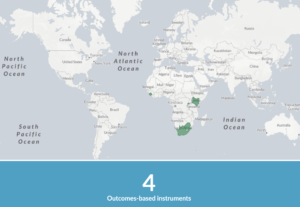 Phase 1 of the CLI identified four upcoming, pipeline OBF4ECCE projects. These are:
Phase 1 of the CLI identified four upcoming, pipeline OBF4ECCE projects. These are:
• Northern Kenya Development Impact Bond
• Rwanda ECCE Outcomes Fund
• Sierra Leone ECCE Outcomes Fund
• South Africa ECCE Outcomes Fund
Learn more about these pipeline projects here.
Consortium Partners
Government Outcomes Lab: The Government Outcomes Lab is a research and policy centre based in the Blavatnik School of Government, University of Oxford. We were created as a partnership between the School and the UK Government and we are funded by a range of organisations. Our role is to investigate how governments collaborate with the private and social sectors to improve social outcomes, with a focus on how these partnerships can be employed more effectively.
NORRAG: NORRAG is the Global Education Centre of the Geneva Graduate Institute and is a global membership-based network of international policies and cooperation in education and training. NORRAG’s core mandate is to co-produce, disseminate and broker critical knowledge and to strengthen capacity for and with academia, governments, NGOs, international organisations, foundations and the private sector who inform and shape education policies and practice, at national and international levels. Through our work, NORRAG contributes to creating the conditions for more participatory, evidence-informed decisions that improve equal access to and quality of education and training.
Ecorys: Ecorys is a world-class economic and social development consultancy with over 35 years of experience in monitoring and evaluation. We combine in-house technical capacity with extensive sectoral and geographical experience, plus a global network of carefully selected Monitoring and Evaluation (M&E) specialists, ensuring our engagements are grounded in a local context. Ecorys has undertaken extensive research into results-based financing, including outcomes-based contacts. These studies have examined both implementation (rationale, enablers and barriers to growth, recommendations for governments/multi-lateral organisations on how they could be used and supported) and their impact, including comparing these to other funding mechanisms.
Education Outcomes Fund: The Education Outcomes Fund is an independent fund hosted by UNICEF with the mandate to champion outcomes-based financing for education. We bring together partners across public, private, philanthropic, and social sectors to mobilise funding, evidence, and innovation towards improved learning and employment outcomes for children and youth.
The knowledge products were developed in partnership with the Education Outcomes Fund (EOF), a UNICEF-hosted fund, and with the support of the LEGO Foundation. The statements in these knowledge products are the views of the authors and do not necessarily reflect the policies or the views of EOF, UNICEF or the LEGO Foundation.
Sub Menu
Archive

